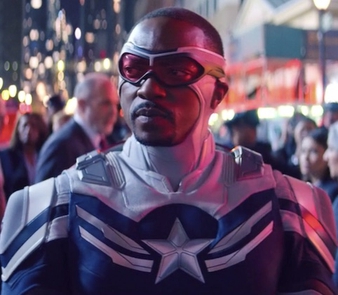When we first meet Sam Wilson in Captain America: The Winter Soldier (2014), he’s not wearing a super suit or carrying a shield—he’s leading a support group for veterans. From the start, Sam is introduced as a compassionate listener and guide for others navigating trauma. Throughout his story in the Marvel Cinematic Universe (MCU), he is not just a hero but a person grappling with responsibility, grief, and self-doubt. His journey from Falcon to Captain America is about more than just learning how to hold the shield—it’s about discovering and accepting who he is and the impact he wants to make on the world. For patients exploring their own paths to growth, Sam’s evolution shows that resilience and self-acceptance are achievable, even in the face of enormous challenges.
A Foundation of Support and Service
Before becoming the Falcon, Sam’s role as a pararescue airman shaped his character. His experiences in war left him with losses and trauma; in particular, he struggles with the loss of his wingman, Riley. Instead of shutting down, he channeled his energy into helping others. His support group meetings in The Winter Soldier show the importance of shared experiences and community in healing. This is an essential concept in therapy—acknowledging that no one has to face their struggles alone.

Sam’s empathy shines as he counsels Steve Rogers about adjusting to life outside the battlefield. “The number of people giving me orders is down to about zero,” Steve jokes, and Sam responds with humor but also understanding, acknowledging the unique challenges of transitioning to civilian life.
Loss and Purpose
Sam quickly becomes Steve Rogers’ trusted friend. In Avengers: Age of Ultron (2015), he continues to provide quiet but crucial support. Though he’s not part of the central team battling Ultron, we see him at the Avengers’ celebratory party and later working behind the scenes to help veterans. These moments reinforce his role as someone who values connection and healing, even while larger-than-life events unfold around him.
His relationship with loss deepens after Avengers: Endgame (2019). The world has changed, and so has he. Disappearing with half of the universe in Infinity War, subsequently returning in Endgame, and then immediately losing Steve (via time) leaves him in a place of uncertainty. When Steve passes him the shield, Sam hesitates; this internal conflict speaks volumes. Imposter syndrome, self-doubt, and the weight of legacy are real struggles many face. The idea that he doesn’t immediately accept his new role reflects a crucial mental health lesson: growth takes time, and stepping into new responsibilities is often a journey, not a single decision.
Facing Systemic Barriers and Personal Doubts
In The Falcon and the Winter Soldier (2021), Sam Wilson wrestles with systemic challenges and personal doubts as he considers taking up the Captain America mantle. Learning about Isaiah Bradley, a forgotten Black super-soldier, forces Sam to confront the historical and racial weight of the shield. Alongside him, Bucky Barnes becomes both a sounding board and a partner in his journey. While Bucky grapples with his own trauma, he also challenges Sam to embrace his worth and the potential for change the shield represents. Their dynamic reveals the importance of support and accountability in navigating identity and external pressures, themes that are often explored in therapy when addressing self-worth and the impact of societal expectations.

“We Can Do Better”
One of the standout moments in The Falcon and the Winter Soldier (2021) is when Sam delivers a speech to politicians after stopping the Flag Smashers. He says, “The only power I have is that I believe we can do better.” This line encapsulates his worldview: optimism in the face of adversity, and the belief that change is always possible, even when it feels daunting. For patients navigating challenges in their own lives, Sam’s message is a beacon of hope. It’s not about having all the answers but about committing to the process of growth and improvement.
Choosing to Lead on His Terms
By the end of The Falcon and the Winter Soldier, Sam doesn’t just accept the shield—he redefines what Captain America means. He openly acknowledges the challenges ahead but steps forward anyway, demonstrating resilience. He doesn’t ignore his struggles; instead, he processes them and grows through them, showing that strength isn’t about having no doubts—it’s about moving forward despite them.
Therapy With a Cinematic Approach
Movies have a way of capturing emotions, experiences, and struggles that can be hard to put into words. At Calming Transformations Counseling, our therapists understand how these challenges can affect your emotional and mental well-being. We use cinema therapy to help clients connect with stories that mirror their journeys, offering fresh perspectives and deeper self-understanding. By exploring characters, themes, and emotions on screen, we create a space for reflection, healing, and personal growth—because sometimes, the right film can say what you’ve been feeling all along.
Contact us here.
Photo Credit: Marvel Studios
